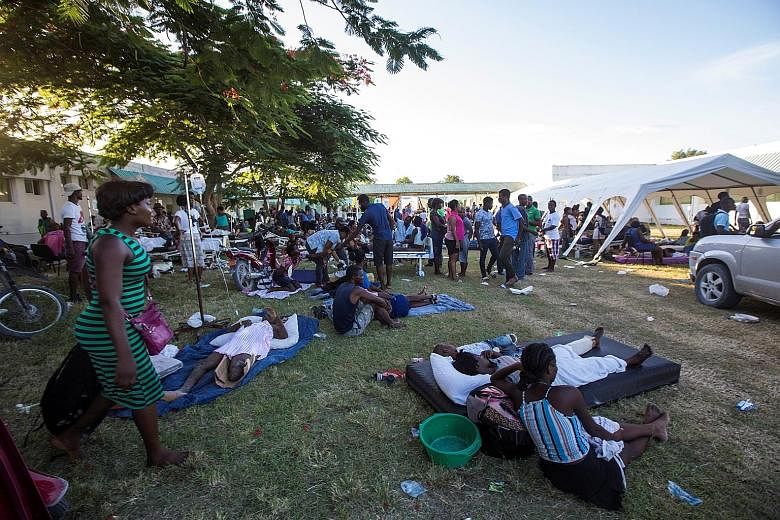LES CAYES (Haiti) • With broken bones and open wounds, the injured jammed into damaged hospitals or headed to an airport in Haiti, hoping for mercy flights out.
A handful of doctors toiled all night in makeshift triage wards. A retired senator used his seven-seat propeller plane to ferry the most urgent patients to emergency care in the capital Port-au-Prince.
A day after a magnitude-7.2 quake killed at least 1,300 people and injured thousands in western Haiti, the main airport of the city of Les Cayes was overwhelmed on Sunday with people trying to evacuate their loved ones to Port-au-Prince, about 128km to the east.
There was little choice. With just a few dozen doctors available in a region that is home to one million people, the aftermath of the quake was turning increasingly dire.
"I'm the only surgeon over there," said Dr Edward Destine, an orthopaedic surgeon, waving towards a temporary operating room of corrugated tin set up near the airport in Les Cayes.
"I would like to operate on 10 people today, but I just don't have the supplies," he said, listing an urgent need for intravenous drips and even the most basic antibiotics.
Compounding Haiti's woes, Tropical Depression Grace was expected to dump enough heavy rain over the country yesterday and early today to create the potential for mudslides and flooding, said the National Hurricane Centre (NHC).
In Les Cayes, as in other hard-hit cities on the south-western peninsula, most of the population spent the night sleeping outdoors in front of their houses - or what remained of them - amid fears of new aftershocks. The streets were filled with the grinding of heavy equipment lifting debris from collapsed buildings, as well as the quieter sounds of people pulling away rubble by hand while searching for the missing.
The authorities in Haiti were scrambling to coordinate their response to the quake, mindful of the confusion that followed one in 2010, when delays in distributing aid to hundreds of thousands of people worsened the death toll.
Prime Minister Ariel Henry promised on Sunday at a news conference "to give a more appropriate response than the one we gave in 2010", with a single operation centre in Port-au-Prince to coordinate the aid efforts.
Dr Paul Farmer, co-founder of the relief agency Partners in Health, which oversees several hospitals in Haiti, said the country's ability to respond to an earthquake had greatly improved in the intervening years.
But he acknowledged that Haiti still faced what he called "old problems", such as bad roads, poor transportation and political volatility, fuelled by gang violence.
Several centimetres of rain could complicate search-and-rescue efforts after the earthquake caused thousands of homes to collapse and made some roads and bridges impassable. The storm was moving west at 24kmh with maximum sustained winds of 56kmh, the centre said in an advisory at 11pm Eastern time Sunday. Grace was about 193km south-east of Santo Domingo, Dominican Republic.
The NHC said that Grace's strength was expected to have "little change" over the next couple of days. The system was previously a tropical storm, but its wind speeds decreased slightly on Sunday.
A tropical storm watch continued for the entire coast of Haiti.
The storm was expected to move towards the island of Hispaniola, and then reach or pass near earthquake-battered Haiti yesterday.
Parts of the Virgin Islands, the Leeward Islands and Puerto Rico could expect 7.6cm to 15.2cm of rain, the centre said, along with flash flooding. The storm was expected to dump rain on Florida, Cuba and the Bahamas next week.
Over Haiti, the storm could dump 10.2cm to 20.3cm of rain, with isolated totals up to 38.1cm, the centre said.
Mr Robbie Berg, a hurricane specialist at the NHC, said the earthquake could increase the chance of mudslides in Haiti. "It could have shifted some of the ground and soil which could make mudslides more common," he said.
NYTIMES, AGENCE FRANCE-PRESSE

